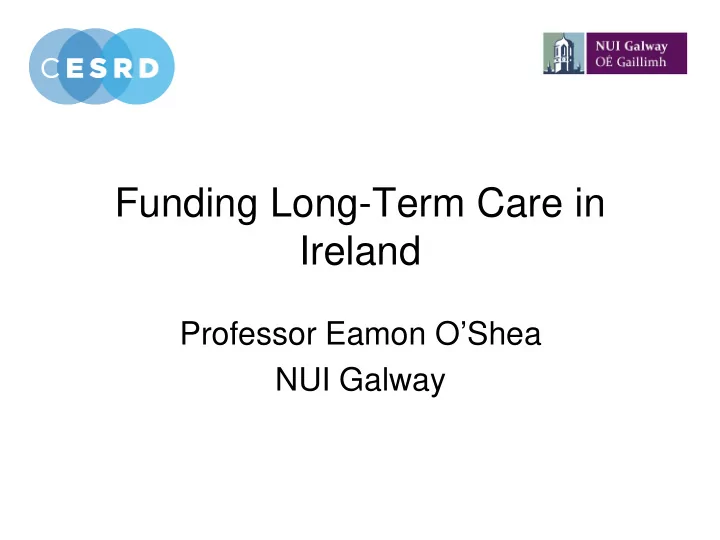

Funding Long-Term Care in Ireland Professor Eamon O’Shea NUI Galway
Care of Older People Year Spending on As % of all HSE Per Capita over Care of Older Gross Non- 65 People Capital €m € 2009 1,738 12.4 3,514 2010 1,683 12.4 3,299 2011 1,433 11.0 2,720 2012 1,365 10.4 2,509 2013 1,366 10.5 2,429 2014 1,468 11.1 2,528 2015 1,569 11.3 2,612
Home Care Market 2014 HSE Home Home Private Help Care Customer Packages s HSE €175m €33 €142 NforP €54 €53 €107m Private €43 €63m €20 €195m €130m €20m €345m
Ageing Reforms • Care of the Aged Report 1968 • Years Ahead Report 1988 – community orientation • Health (Nursing Homes) Act 1990 • Nursing Homes Support Scheme (Fair Deal) 2009 • National Dementia Strategy 2014
Fair Deal • People generally contribute 80 per cent of their pension towards cost of care • 7.5 per cent annual contribution from the asset value of the family home - charged for three years. • Cost €948 million in 2015 for 22,000 people • Reviewed in 2015 - sustainability concerns
Advantages of Fair Deal • Certainty • Statute-based • Transparent • Choice • Market stability • Equity within older people cohort (compared to previous arrangements)
Criticisms of Fair Deal • Cost sharing • Means-testing • Bureaucracy • Residential bias • Farm assets • Inequity – relative to other age cohorts, illnesses and diseases
Home Care • Fair Deal confined to residential care • No statutory basis for home care • Uncertainty of community-based funding • Significant un-met need in the community • Reliance on family care • Supply-driven model • Personalised care only developing • Social model is weak
What Do Older People Want? • Good information • Choice • Individualisation of care • Integrated care • Family involvement • Opportunity to live well at home
Principles for Funding Long-Stay Care • Care requirements should determine funding - individualisation • Funding bias towards home care solutions - different funding bundles • Access to public resources on the basis of need • Common measure of dependency – Single Assessment Tool
Financing Options • Family • Market • Private insurance • General taxation • Social insurance
Family • Families provide bulk of care in Ireland • Contribute close to 50% of total cost of dementia care – around 1 billion euro • Family responsibility – freely chosen or compulsory? • Mutuality • Longitudinal issues • Support structures
Private Markets • Development of private home care market • Private expenditure on home care services and supports is increasing • Autonomy and choice – preference revelation – likely to increase • Equity - voice and exit issues • Public-private mix – is there optimal mix?
Private Insurance • Moral hazard • Adverse selection • Affordability • Appropriate products – biased to residential care • Cost sharing levels unacceptably high • Information deficiencies • Consumer myopia
General Taxation • Structures already exist for collection and administration of funds • Broadness of tax base; maximum risk pooling • Democratically accountable • Universality • Problem of accessing money - competing priorities • Taxation has not delivered for home care
Social Insurance • Visibility of long-term care • Transparency and accountability • Risk pooling-albeit narrower than tax base • Life-time contribution – solidarity and reciprocity • Competitiveness issues • Contribution may be too high for political system to bear
Co-Payments • Cost-sharing • Supplements taxation and social insurance system – keeps taxes and social insurance payments lower • Incentives and nudges • Impact on demand and use of services • Universality – citizenship • Means testing - costs and benefits
Conclusion • Spending 3 times more on residential care than home care • Family carers remain central of the care system • Need individualised home care solutions, more choice, including better/different housing • Community-based care requires additional and statutory-based funding • Social insurance should be re-examined as potential funding model for long-stay care in Ireland
Recommend
More recommend